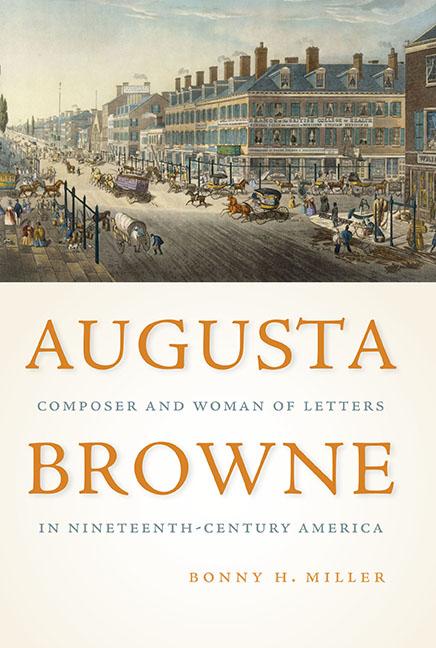Book contents
- Frontmatter
- Contents
- List of Illustrations
- Preface
- Acknowledgments
- Introduction
- 1 First Steps
- 2 Apprentice in a Family Music Business
- 3 Philadelphia Debut
- 4 A Young Professor of Music
- 5 A New Leaf
- 6 Her Own Woman
- 7 Courtship and Consequences
- 8 Pilgrim in Progress
- 9 “Glad Fruition”
- 10 Legacy in Music
- 11 Legacy in Literature
- 12 Contributions to Music Journalism
- 13 A Legacy Written into History
- Appendixes
- Appendixe 1 Children and Descendants of David Samuel Browne and Elizabeth Montgomery Browne
- Appendixe 2 Chronology of Augusta Browne’s Music and Letters
- Appendixe 3 List of Musical Works
- Appendix 4 Selected Glossary
- List of Abbreviations
- Notes
- Selected Bibliography
- Index
10 - Legacy in Music
Published online by Cambridge University Press: 23 October 2020
- Frontmatter
- Contents
- List of Illustrations
- Preface
- Acknowledgments
- Introduction
- 1 First Steps
- 2 Apprentice in a Family Music Business
- 3 Philadelphia Debut
- 4 A Young Professor of Music
- 5 A New Leaf
- 6 Her Own Woman
- 7 Courtship and Consequences
- 8 Pilgrim in Progress
- 9 “Glad Fruition”
- 10 Legacy in Music
- 11 Legacy in Literature
- 12 Contributions to Music Journalism
- 13 A Legacy Written into History
- Appendixes
- Appendixe 1 Children and Descendants of David Samuel Browne and Elizabeth Montgomery Browne
- Appendixe 2 Chronology of Augusta Browne’s Music and Letters
- Appendixe 3 List of Musical Works
- Appendix 4 Selected Glossary
- List of Abbreviations
- Notes
- Selected Bibliography
- Index
Summary
Augusta Browne remained first and foremost a pianist-composer even though she published many songs and taught voice. The piano stood at the heart of her life in music. She paid tribute to her principal instrument, writing, “The piano is the most domestic of all instruments. Mine stands to me almost in the place of a human friend.” Around this “old companion” hovered a “thousand innocent and blissful associations of childhood.” The hours she spent at the keyboard as a youngster were not practice alone, but also recreation, solace, and reverie.
Her output of music over a lifetime unfolded from keyboard skills and harmonic understanding initially learned through the Logierian system of instruction. Even the youngest children learned chords and voice leading from their first lessons in this system. This early underpinning in music theory—known then as the science of music—provided the foundation for Augusta's development as a composer. Publication of set after set of variations counters Tick's assertion that variations were an “atypical genre for most mid-nineteenth-century women.” With years of immersion in Logierian materials, variations were the most natural form in the world for Augusta to perform, improvise, and compose. She incorporated variation technique in most of her piano pieces throughout her life, even when those compositions embodied a larger genre such as the fantasy or march.
Keyboard Works
By mid-century the piano was firmly established as the primary household instrument in North America; as Augusta wrote in 1862, “A house destitute of a piano is like a landscape without water—dry, irredeemably dry.” In The Dawning of American Keyboard Music, J. Bunker Clark sorted American piano music published before 1830 into five principal genres: sonatas, rondos, variations, medleys, and battle pieces. Although Augusta was well acquainted with all of these genres, her own keyboard compositions fall into the categories of variations, medleys (national bouquets), and character pieces (e.g., romances) that sometimes assume ternary form, rondo form, or free adaptations of these forms.
Among her earliest surviving publications is the set of variations based on “The Gipsie's Wild Chant”—a catchy tune from Alexander Lee's opera Lo Zingaro—laid out the formula that Augusta would apply to subsequent variation sets.
- Type
- Chapter
- Information
- Augusta BrowneComposer and Woman of Letters in Nineteenth-Century America, pp. 214 - 262Publisher: Boydell & BrewerPrint publication year: 2020



